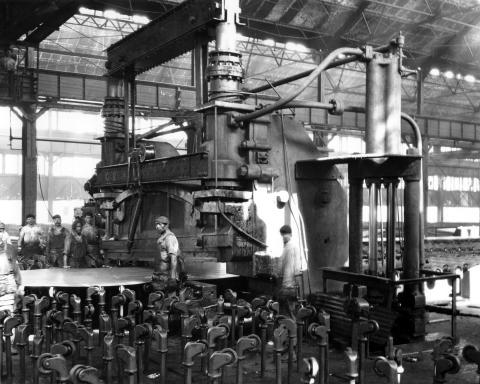
Today's #WorkerWednesday goes inside the Midvale Steel and Ordnance Company's factory in Coatesville, Pennsylvania. A note on the reverse of this photograph, taken on August 5, 1921, identifies the machinery in the image as guillotine shears.
This image of part of Hagley Library's collection of George Atwell Richardson photographs (Accession 1969.082). Richardson (1886-1976) was an engineer with an expertise in metallurgy; he spent his career primarily involved in technical publicity and sales for major steel manufacturers such as the Midvale Steel & Ordnance Company and the Bethlehem Steel Corporation. Many of the images in this collection, like this one, document the Midvale Steel & Ordnance Company's operations in Coatesville, Rosedale, and the Nicetown neighborhood of Philadelphia, Pennsylvania.
The Midvale Steel Company manufactured steel parts and was known for casting, forging, and machining high-quality steels, including alloy steels, and precision steel products for a wide array of industries. Their primary business came from work related to railroad and ordnance manufacturing, particularly for the U.S government and for private companies like the Pennsylvania Railroad and Baldwin Locomotive Works in Philadelphia.
The company was established in 1867 in the Nicetown area of Germantown, Philadelphia by English steel-maker William Butcher (circa 1791-1871). Upon his death in 1871, the Butcher Steel Works became the Midvale Steel Works with engineer Wiliam Sellers (1824-1905) as president. They changed their name again in 1880 to the Midvale Steel Company.
In 1875, the company became an important contractor of ordnance for the U.S. government. With the rapid expansion brought about by World War I, the company became the Midvale Steel and Ordnance Company in 1915, and began operating plants in Johnstown and Coatesville, Pennsylvania in addition to their original works in Philadelphia.
Midvale also became notable in the 1890s when it began hiring Black employees to work alongside its white labor force, a practice so out of the ordinary among Philadelphia industries at the time that it attracted the attention of sociologist and activist W.E.B Du Bois. In his 1899 work, The Philadelphia Negro: A Social Study, Du Bois wrote:
"The practical exclusion of the Negro from the trades and industries of a great city like Philadelphia is a situation by no means easy to explain...There came some time [at] the Midvale Steel Works [that] a manager whom many dubbed a 'crank'...had a theory that Negroes and whites could work together as mechanics without friction or trouble. In spite of some protest he put his theory into practice, and today any one can see Negro mechanics working in the same gangs with white mechanics without disturbance."
Around the time this photograph was taken, an estimated 4,000 Black workers, out of a labor force of 11,000, were employed at Midvale's Philadelphia plant. Shortly after this photograph was taken, in 1923 , Midvale’s Johnstown and Coatesville plants were acquired by the Bethlehem Steel Company.
The company then operated under the name Midvale Steel Company in its original location in Nicetown until 1955, when it merged with the Heppenstall Steel Company to become Midvale-Heppenstall Company. The Nicetown plant in Philadelphia closed in 1976.
This collection has not been digitized. However, our Digital Archive does included digitized material from Hagley Library's Midvale Steel Company plant album (Accession 1974.362) and our collection of Midvale Steel and Ordnance Company motion picture films (Accession 1970.034).

